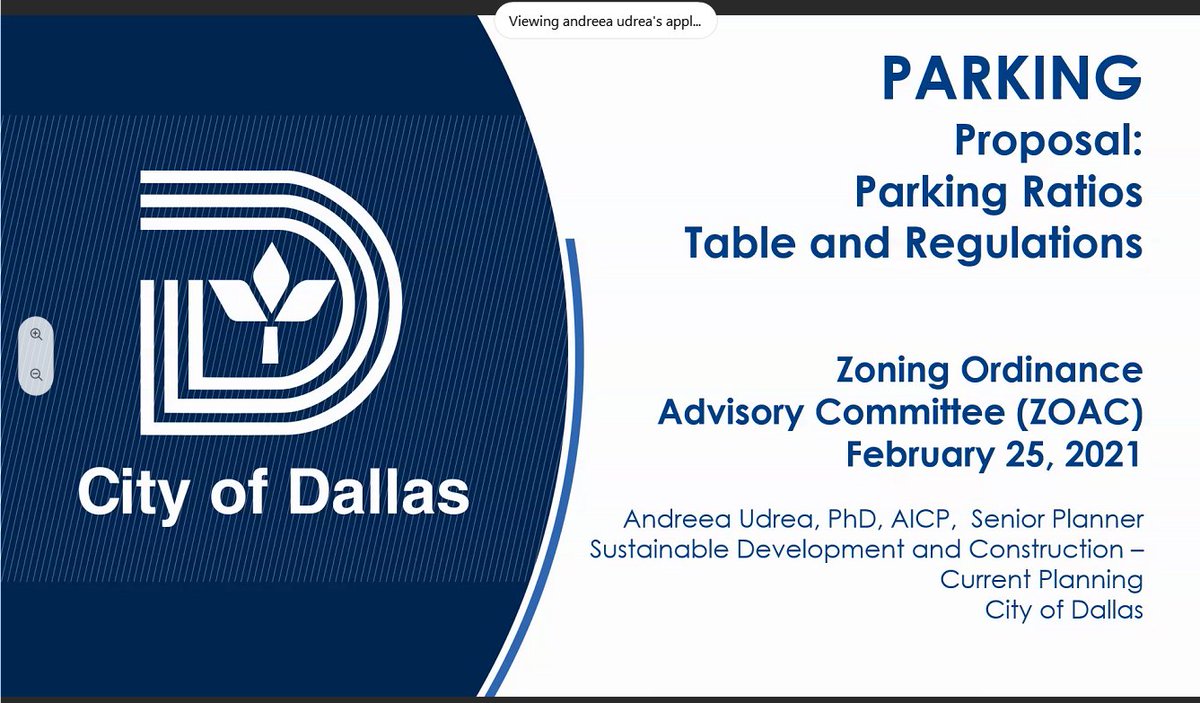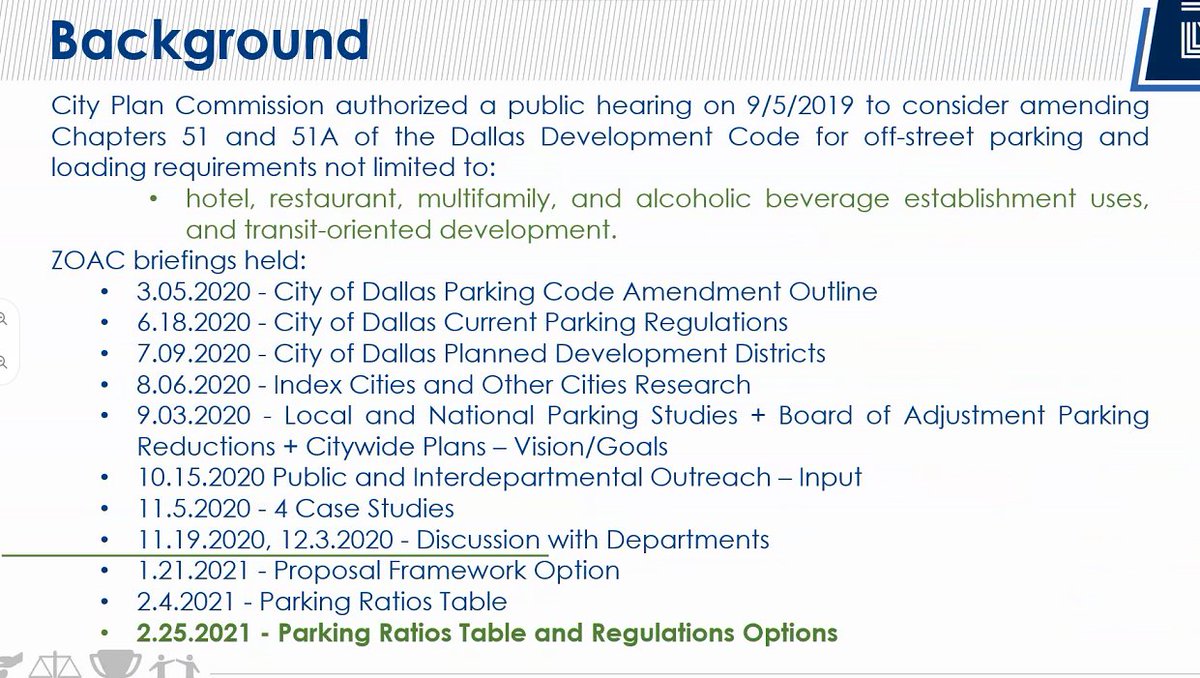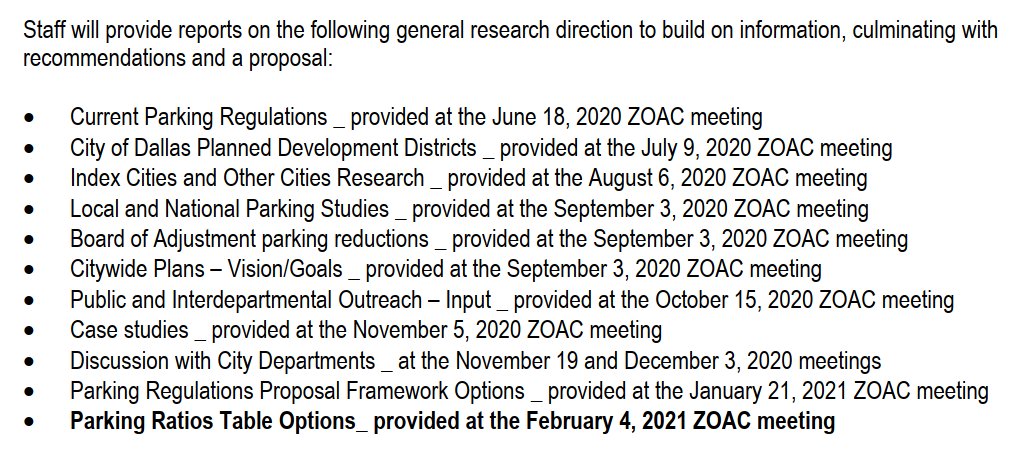
Good morning! Why is it good? Because we are back at the Zoning Ordinance Advisory Committee (ZOAC) to talk about Minimum Parking Requirements (MPRs)!
Last time the residents around some of the more popular nightlife districts showed up in force to oppose a change to the status quo. Since then, the Lower Greenville Neighborhood Association has also sent a letter of opposition to change. ☹️
However! Hope springs eternal and I, for one, and optimistic that we can aspire to better outcomes for everyone, including neighbors, than our minimum acceptable policy we have now.
Super important topic this week: Parking Management Mechanisms! Why so important? Because removing MPRs is only ONE of 3 legs of good parking policy. 

The 3 elements being:
1) Eliminate MPRs
2) Charge the right price for on-street parking
3) Invest those parking dollars back into the neighborhood
1) Eliminate MPRs
2) Charge the right price for on-street parking
3) Invest those parking dollars back into the neighborhood
Staff met with several public improvement district (PIDs) and other groups to discuss current reform efforts (good idea!). The PIDs would be the most natural tool for managing parking districts. 

Staff notes that the areas they met with are all taking fairly coordinated approaches to parking and most have reduced requirements already due to Planned Development districts.
Note: These reductions are very modest.
Note: These reductions are very modest.
Staff says the consistent comment is that there is a lack of coordination with usage of the right of way (ROW). Use of the curb space in the ROW is entirely disconnected from the zoning code.
The Transportation Management Districts (TMDs) get complicated.
Note: the areas where things like TMDs (or PBDs) make sense are already complicated with sophisticated management tools (like the PIDs) in place.
Note: the areas where things like TMDs (or PBDs) make sense are already complicated with sophisticated management tools (like the PIDs) in place.

Austin gets a shout-out in the first case study. Any personal anecdotes or analysis from Austinites (@DanKeshet?) welcome! 

I've read through the Austing PTMD before. It's better than nothing, but definitely a little weak. What's up with only 51% of the funds going to the neighborhood? Minimum 100 parking meters? We can do better.
I think there's a fairly limited range of projects the funds can be used on too. Should be flexible and directed by the management entity. 

Houston is up next!
Note: I drafted an enabling ordinance for Dallas, I basically copied Houston's (with some tweaks).
Note: I drafted an enabling ordinance for Dallas, I basically copied Houston's (with some tweaks).

Houston's had some good aspects, like the 1000 foot residential parking permit (RPP) and most of the money actually goes back to the district. 

One challenge in Dallas: City Code limits us to 10% growth in the number of metered spaces each year, such are their unpopularity.
On to discussion! ZOAC Behring asks about how this will tie on-street parking to the off-street parking requirements.
Staff urges members to think of MPRs separately from on-street, at least on paper, due to ROW management needs.
Staff urges members to think of MPRs separately from on-street, at least on paper, due to ROW management needs.
The idea being that they don't want to create non-conformity due to ROW changes (e.g. a bike or bus lane involves removing on-street parking).
Note: To me this is just an argument for eliminating MPRs!
Note: To me this is just an argument for eliminating MPRs!
ZOAC MacGregor: Asks if we've talked to large developers because they say parking is being required by banks.
Note: This is a red herring as developers can provide parking if they want to. Our job as the city is to control the ROW and spillover effects.
Note: This is a red herring as developers can provide parking if they want to. Our job as the city is to control the ROW and spillover effects.
Also, banks follow the market, they don't create it. If the regulatory environment for MPRs changes, banks will too.
ZOAC Rieves: Asks about how much is actually being collected in Houston.
Houston budget is showing $100k
Houston budget is showing $100k
https://twitter.com/WilsonCalvert/status/1382699994638082059?s=20
Chair Murphy summarizes the purpose of parking management district very well by noting they can be used to build political support.
Chair Murphy asks if the City has a means to actually tow cars.
Staff David Nevarez: The city doesn't have a towing service in-house, but has 2 staff issuing parking citations.
Staff David Nevarez: The city doesn't have a towing service in-house, but has 2 staff issuing parking citations.
Chair Murphy says there's not much enforcement.
Counterpoint: Adding PBDs give us the chance to raise more funds for enforcement!
Counterpoint: Adding PBDs give us the chance to raise more funds for enforcement!
Now for public comment! Six speakers today, which is pretty hefty for a ZOAC meeting.
Commenter: Older neighborhoods were deprived of the use of their buildings with the 1965 parking ordinance. Says the trendy areas noted (deep ellum etc.) have been able to expensively coordinate reductions in parking but his southern Dallas area can't afford that!
Next Commenter: Says the neighborhoods like Lower Greenville has used Parking as a management tool for litter and noise, but this has come at the expense of a host of other problems and negatively impacts 99% of the rest of city.
Note: Wow! Lots of parking reform love!
Note: Wow! Lots of parking reform love!
Next commenter: Representative of the Lower Greenville Neighborhood Avenue says they want to meet with staff to talk about this reform. Repeats that parking is the only tool left to cities to manage alcohol due to state pre-emption.
Supportive of this reform generally (I think they said that?), but says it is a bad fit for Lower Greenville due to its unique situation. Says our public transportation is too bad to support multi-modal.
Chair Murphy previews next meeting: Two guest speakers Asst. City Manager Johnson and someone from DART.
That's it. Progress overall! Even the negative comments were more tempered than last week's. The quality of the discourse is improving :)
• • •
Missing some Tweet in this thread? You can try to
force a refresh










